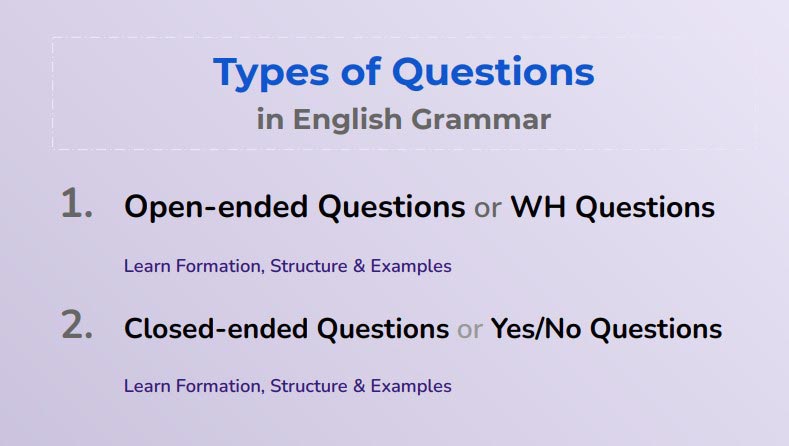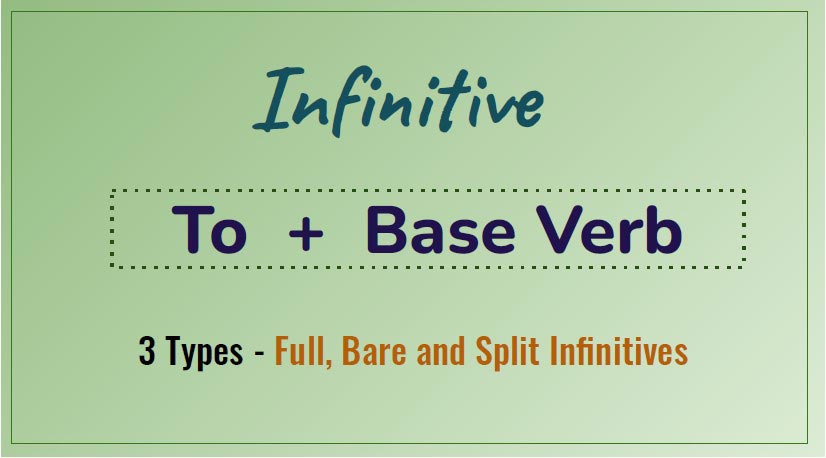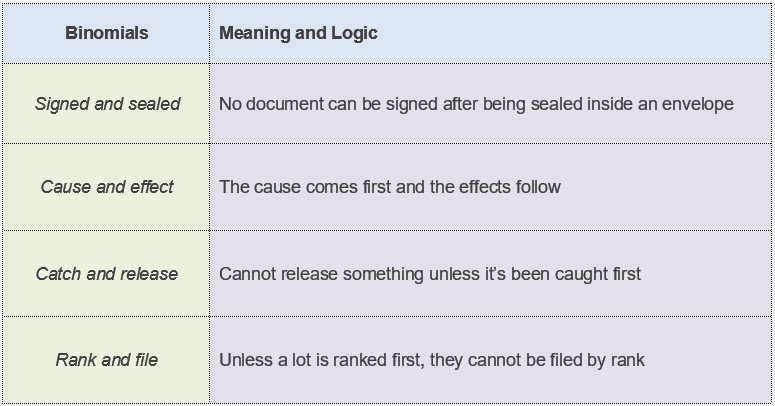Complex Sentence: Definition, Formation and More
Complex Sentences are not as complicated as the title entails. All one has to do is get their head around the methods to formulate these sentences labeled “Complex”. Read on for detailed tips for constructing these sentences along with the all important definition and what parts they are made of.
Complex Sentence Defined
Complex Sentences are at least two sentences joined together. One Independent Clause and at least one Dependent Clause are joined by Subordinating Conjunctions to make one complete sentence. Clauses are simple sentences which means they have a subject and verb(s) of their own. Without being attached to the Independent Clause, the Dependent one(s) does not convey a complete sense when the Independent one does.
Complex Sentence Formation
Every Complex Sentence can be broken down into three parts. Having a clear idea about each of these parts will allow anyone to construct perfect Complex Sentences without having to pay too much attention to their actual formation every time. Check out the formula for constructing error-free Complex Sentences.
Independent Clause + (Subordinating Conjunction + Dependent Clause)
Or,
(Subordinating Conjunction + Dependent Clause) + (,) + Independent Clause
For example, “They did not move until the rain had stopped” - here, “They did not move” is the Independent Clause, “until” is the Subordinating Conjunction, and “until the rain had stopped” is the Dependent Clause.
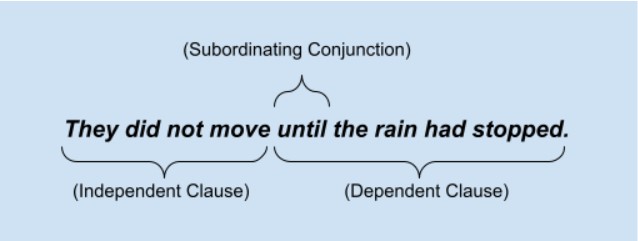
“If you wish to continue, please do” - on the other hand, has “If” as the Subordinating Conjunction, “If you wish to continue” as the Dependent Clause before the all important comma (,) that is followed by the Independent Clause, “Please do.”
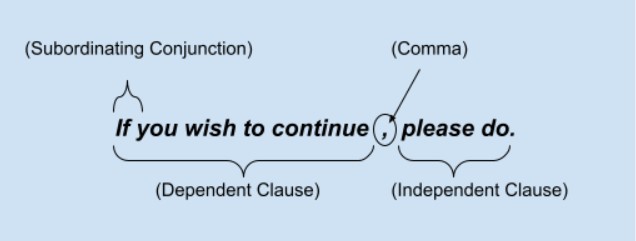
More examples:
- When I went to bed, an owl was hooting.
- I know the guy who ratted you out.
- I was a fish out of water as I stepped onto the stage to recite a poem.
More Complex Sentence Examples
Parts of Complex Sentences
A little bit is stated about all three parts of the Complex Sentence below for a clear conception of how they work and the purpose they serve as sentences in the English language. Let’s take a look -
1. Independent Clause
Independent Clauses are full sentences that convey a complete sense without external help. These are the firm bases of Complex Sentences. If it was unnecessary to stretch the length of the expression with added conditions or relevant information, these clauses can strongly stand their ground on their own.
“My friends love gossiping over tea as long as they aren’t in a hurry to get home.” - The Independent Clause here is “My friends love gossiping over tea” since it conveys clear and complete sense on its own and there remains no scope for further information to be added.
More Examples:
- The police car crossed our bike as we were on our way to the beach.
- Before we left the house, we had arranged a meeting.
- It was no easy task since they were already on the move.
2. Dependent Clause
Dependent Clauses are the exact opposite of Independent Clauses. They depend on other Independent or Dependent Clauses nearby to build a complete sense. This takes the baton from the Independent Clauses and continues the sense to make at least two sentences worth of information tucked into one Complex Sentence.
“I kept walking until the lighthouse was in sight.” - The Dependent Clause here is “Until the lighthouse was in sight” since it cannot convey a complete sense on its own and requires the Independent Clause to fulfill it.
More Examples:
- Don’t get out unless you’ve registered.
- Since we had to reach the riverbank, we started rowing the boat.
- They loved watching anime whenever there was time.
3. Subordinating Conjunction
The conjunctions that join or link Dependent and Independent Clauses to construct Complex Sentences in particular are called Subordinating Conjunctions. These words or phrases have an opportunity for further information to be added. Often there is a cause and effect relationship between the clauses linked by the Subordinating Conjunctions.
For example, “I was blabbering on, whereas I should have kept quiet.” - The Subordinating Conjunction here is “Whereas” because it links the two clauses as well as being attached to the Dependent Clause.
More Examples:
- Hikers enjoy the journey because that is the best part.
- Whether you like it or not, I will follow my heart.
- Drink enough water if you do not want to be dehydrated.
Comma: There is a tiny punctuation mark present in a large number of Complex Sentences and it is “Comma”. It is rather hard to ignore its importance in them since the sentences remain confusing and incomplete without the right use of the commas. When the Subordinating Conjunction starts the sentence and the Dependent Clause follows, the comma sits before the Independent Clause. “However” usually has two commas on either side of it, “Whereas” has one comma before it and so on. Comma helps partition the two or more clauses in Complex Sentences and clears out unnecessary confusions regarding where to pause.
For example, “Before we left the house (,) we had arranged a meeting.” - The comma here dictates where to pause in speech so that the two sentences are correctly partitioned and the reading becomes seamless. Without the comma or the pause, the reader will read on and find it hard to divide the two clauses for a clear conception.
More Examples:
- If you knew me (,) it would not have been an issue.
- However you achieve it isn’t my concern (,) I just want results.
- Although we planned to leave early (,) the rain didn't let us.
Transformation: Simple to Complex Sentence
By learning how to convert Simple Sentences into Complex ones, learners get a clear idea as to how exactly Complex Sentences are constructed. Changing the forms of the sentences (Simple, Complex and Compound) without altering their meaning is called Transformation of Sentences as per the English grammar.
Simple Sentence: The wounded tiger is fierce.
Complex Sentence: The tiger that is wounded is fierce.
The breakable portion of a Simple Sentence is split into a phrase containing Subordinating Conjunction while the rest of the sentence stays intact. Two clauses (at least one Dependent and one Independent Clause) linked by Subordinating Conjunction would be a Complex Sentence.
P.S. Beware of mixing up Complex and Compound Sentences and using the right type of Conjunctions.
This is the very basic construction of Complex Sentences, more layers can be added to make the sentences longer and more complex in nature by increasing the number of Dependent Clauses as well as correct punctuation marks (comma, semicolon etc.).
Grammar
Read More
- How to Use "Therefore" in Sentences Avoiding Common Mistakes
- How to Use "Whereas" with Examples and Avoid Common Mistakes
- When and How to Use "Thus" Correctly Without Common Mistakes
- How to Use "On the Contrary" Properly with Meaning and Examples
- When and How to Use "Either/Or" with Examples and Common Mistakes to Avoid
- How to Use "On the Other Hand" Effectively without Mistakes
- How to Use "Respectively" with Example and Common Errors to Avoid
- How and When to Use "Moreover" Without Mistakes
- How to Use "Likewise" in Sentences Based on Context & When not to Use
- When & How to Use "Although" in Sentences to Avoid Mistake

